|
Crematogaster (Atopogyne) buchneri Forel
  Type location Angola
(Cremastogaster Buchneri n.
spec., Forel, 1894b: 94, worker; Emery, 1899e: 479, queen), collector
Dr
Buchner - see below Type location Angola
(Cremastogaster Buchneri n.
spec., Forel, 1894b: 94, worker; Emery, 1899e: 479, queen), collector
Dr
Buchner - see below
junior synonyms (here)
composita (Crematogaster
(A.) buchneri For. v. composita
n. var., Santschi, 1933b: 101, worker)
from Zaļre, Kasai, E Luja - see http://www.antweb.org/specimenImages.do?code=casent0912626: identical
graeteri (Cremastogaster
Buchneri For. v. Graeteri
n. var., Forel, 1916: 409, worker) from Zaļre,
at St. Gabriel, by Kohl - see http://www.antweb.org/specimenImages.do?code=casent0908627
- minor worker
uasina (Crematogaster
(Atopogyne) Buchneri Forel var. uasina nov., Santschi, 1935b: 271,
worker) from Kenya, Kitale, Alluaud & Jeannel - headless
type at http://www.antweb.org/specimenImages.do?code=casent0915372
foreli (C. buchneri For.
subspec. foreli. nov. subspec., Mayr, 1895: 138, worker)
from "Slave Coast" - Guinea; minor worker - see below
halli (Crematogaster
(Atopogyne) halli sp. n., Donisthorpe, 1945b: 268, worker) from Ghana,
collected by H.E. Box, Bunsu,
1.i.1945, reportedly from hollow stem domatia of Canthium
glabrifolium, named in honour of W.J. Hall - minima worker - see below
polymorphica (Crematogaster (Atopogyne) africana Mayr, polymorphica subsp, nov.Weber, 1943c: 357, worker; new status here) from South Sudan; Imatong Mts - see below
 . .
|
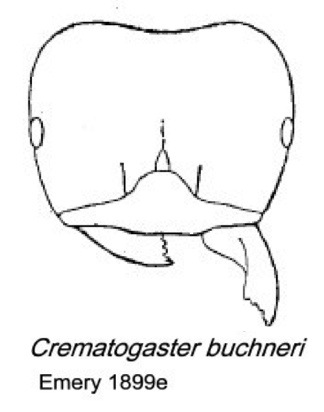 Forel's (1894b)
description is at Forel's (1894b)
description is at  . Emery's (1899e) description is at . Emery's (1899e) description is at  . Arnold (1920a: 520) provided a
translation, this is at . Arnold (1920a: 520) provided a
translation, this is at  . Mayr's (1895)
description of foreli is at . Mayr's (1895)
description of foreli is at  . Santschi's (1933b)
description of composita
is at . Santschi's (1933b)
description of composita
is at  . Santschi's (1935b)
description of uasina is at . Santschi's (1935b)
description of uasina is at  . Donisthorpe's (1945b)
description of halli is at . Donisthorpe's (1945b)
description of halli is at  . Weber's (1943c)
description of polymorphica is at . Weber's (1943c)
description of polymorphica is at  . .
Forel (1916) separated graeteri as - workers, TL
2.7-3.6 mm; propodeal spines shorter than type, about equal in length
to 1/3 the inter-base distance; the truncated portion of the mesonotum
in very abrupt, forming a near right angle with the dorsum; St Gabriel,
Congo, collected by Kohl, carton nest.
|
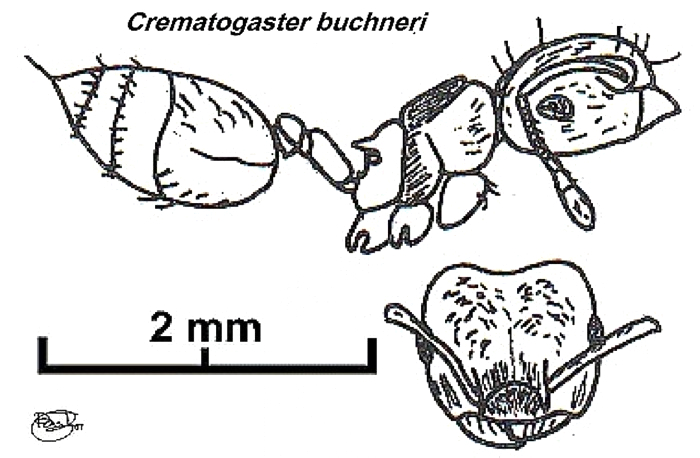 Nigeria specimens (Taylor, 1979: 37) - WORKER.
Size
variable TL 2.68-4.26 mm; largest HL 1.03, HW 1.00, SL 0.78, PW 0.65 Nigeria specimens (Taylor, 1979: 37) - WORKER.
Size
variable TL 2.68-4.26 mm; largest HL 1.03, HW 1.00, SL 0.78, PW 0.65
Colour usually dark brown-black. Sculpturation of coarse striations on
the lateral mesonotum. Relatively coarse pilosity, erect hairs mainly
on the head and gaster. Alitrunk profile with pronotum square
shouldered, mesonotum carina well developed, descent to metanotal
groove steep to near vertical, groove deeply impressed. Propodeal
spines relatively narrow and blunt with a prominent spiracle at their
base. Postpetiole with rectangular lower anterior corners.
This appears to match the halli syntype shown below in shape
and appearance.
|
Emery (1899e) provided a drawing of the head of the
major.
It builds large carton nests on certain forest trees,
and less often on cocoa trunks. Eguagie (1975) reported a nest
population of 46,662 workers and 141 alate queens and males, plus 1400
larvae and 1869 pupae. Forages off the nest trees on to cocoa and other
adjacent trees. Tends pseudococcids.
Wheeler
(1922) also recorded it from Cameroun (by Conradt).
Although not very common in Nigeria, it can be a
dominant species (Taylor, 1977). Eguagie (1971) found it at Araromi and
Moor Plantation near Ibadan, and reported it as being physically
destructive on cocoa (chewing the surface of young pods), kola and wild
host plants (Eguagie, 1973, 1975).
In Ghana, Strickland (1951a) found that at CRIG
what he describes as the depressa-buchneri group was more
common (218 collections) than africana (27 collections) but
less so than striatula (778 collections). He lists numerous
other host forest trees, plus citrus and kola. Bolton (1970-71) listed
it as one of the six most common carton-nesting Crematogaster species
on cocoa (simply at CRIG or in Ghana is not clear) and noted that it
was a common species. Leston (1973) also regarded it as a dominant. It
was collected by Room (1971) in 13 of his 168 canopy samples at cocoa
farms; he notes that it was rarer than he had expected from its status
as a dominant. Room also reported its occurrence on cocoa mistletoe -
being third most abundant insect, with 15,158 workers, from 87 of 630
samples of the mistletoe/cocoa junction (ranked 7th), and 26 of 175
samples of mistletoe plants (ranked 11th) (Room, 1972a, b, 1975). Majer
found it in only 1.4% of his 144 pkd samples at Kade, but with over
2000 workers per sample (1975, 1976a, b, c). Bigger (1981a) lists it as
found on 4.7% of cocoa trees in a survey of 338 trees at 29 scattered
sites with swollen shoot virus.
Strickland (1951a) added that the depressa-buchneri
group was essentially African, from Ivory Coast east to the
equatorial forests of Sudan.
|
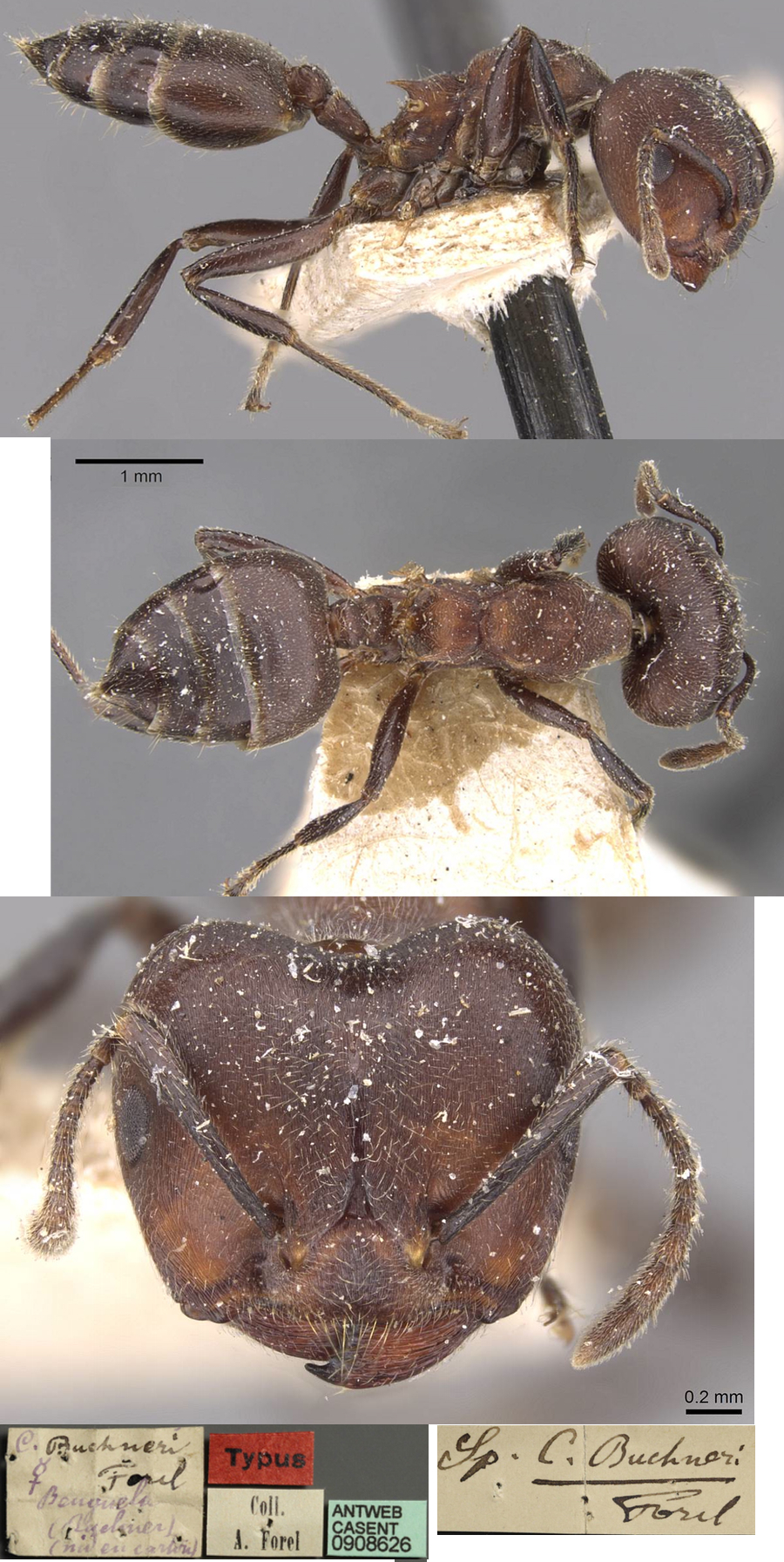 The
photomontage of the type major worker is
collated from http://www.antweb.org/specimen.do?name=casent0908626 The
photomontage of the type major worker is
collated from http://www.antweb.org/specimen.do?name=casent0908626
|
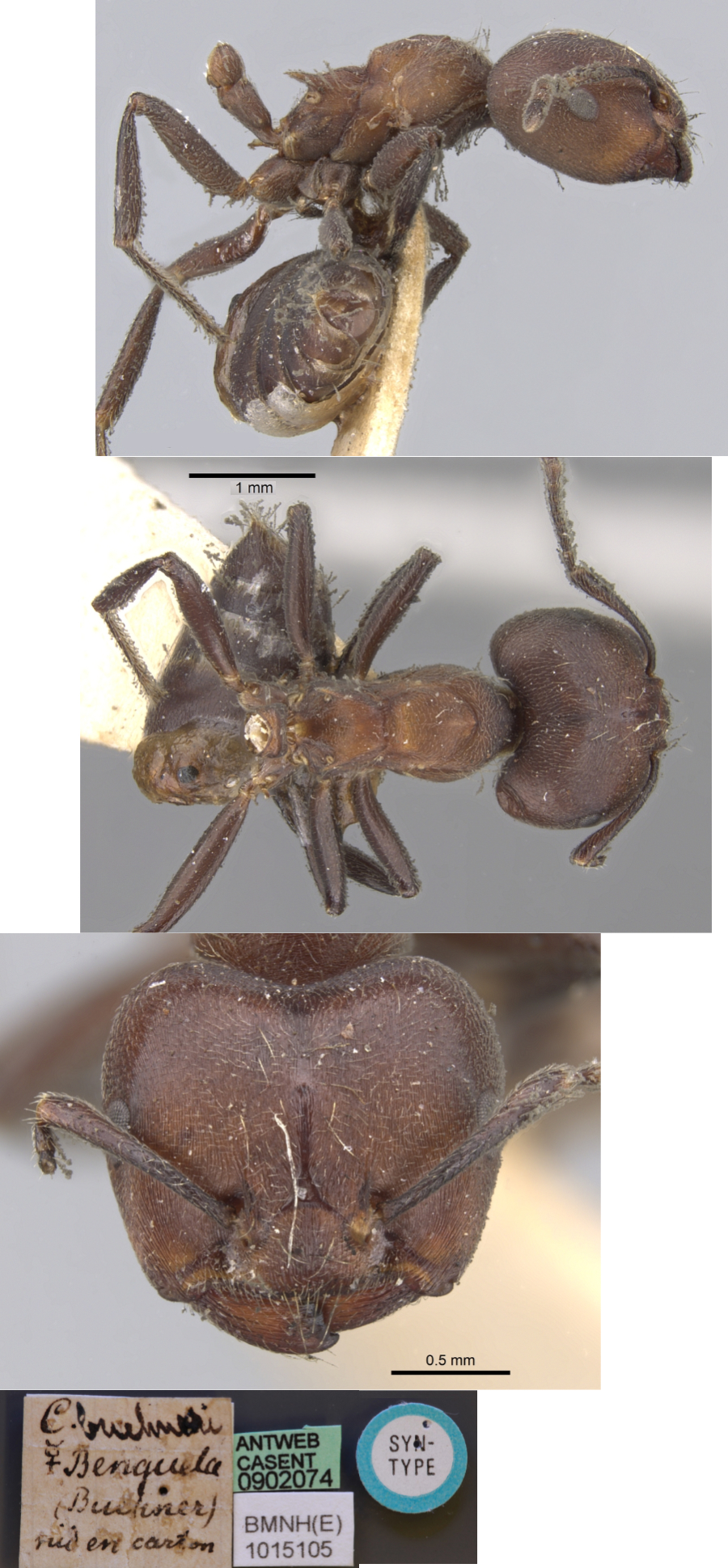 The
photomontage of a syntype major worker is
collated from http://www.antweb.org/specimen.do?name=casent0902074 The
photomontage of a syntype major worker is
collated from http://www.antweb.org/specimen.do?name=casent0902074
|
Oxford University Museum
specimens
Crematogaster (Atopogyne) buchneri
B Taylor det. |
Ivory Coast
Erena Dupont
v.2014
|
Taļ National Park
5˚45'00" N
7˚07'00" W
|
20
media
|
1
|
 |
Crematogaster (Atopogyne) buchneri
B Taylor det.
|
Cameroun
G Debout & A Dalecky
Cameroon 116
|
17.ii.2000
Kouedjina
3°55' N
13°45' E
|
no details
|
1
|
 |
Crematogaster (Atopogyne) buchneri
B Taylor det.
|
Cameroun
A Fotso Kuate
Crematogaster sp24
|
28.ix.2007
Boga
03°54'30" N
11°25'58" E
|
Quadrat in
forest
|
1
|
 |
|
 The
photomontage is of a worker from Cameroun, Kouedjina;
collectors McKey Wolbachia project (Cameroon 116). The
photomontage is of a worker from Cameroun, Kouedjina;
collectors McKey Wolbachia project (Cameroon 116).
|
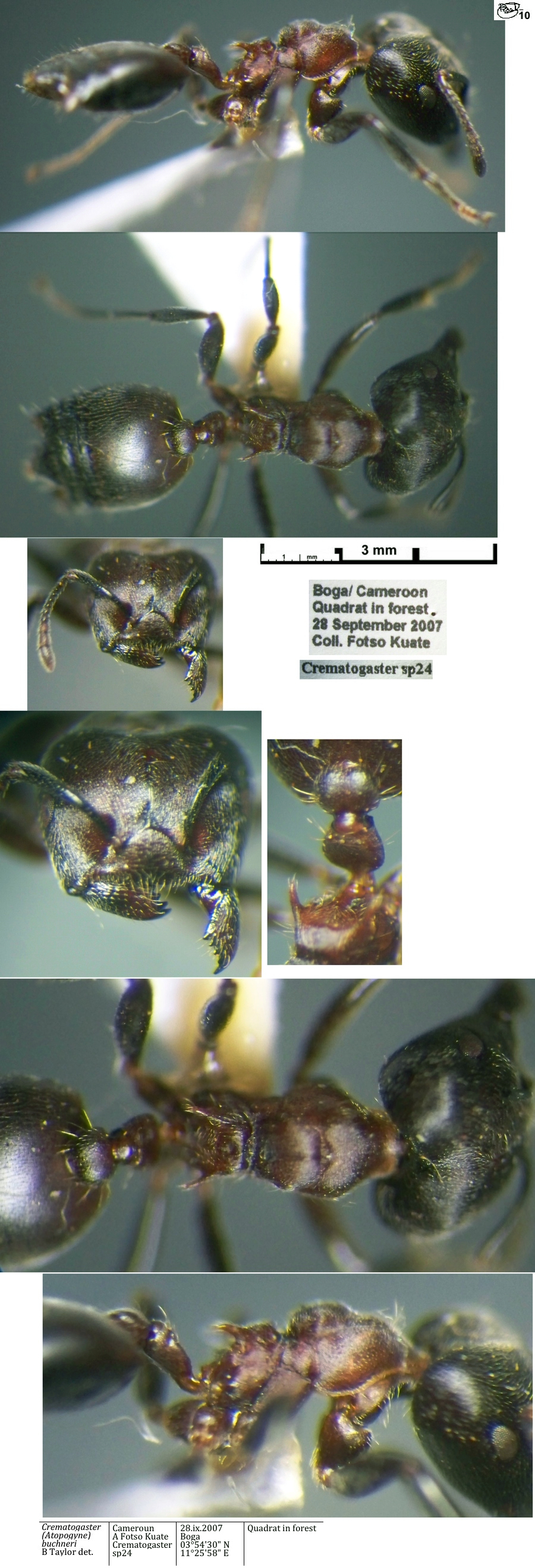 The
photomontage is of a major worker from Cameroun; Boga; collector. A
Fotso Kuate (fk sp 24) The
photomontage is of a major worker from Cameroun; Boga; collector. A
Fotso Kuate (fk sp 24)
|
 The
photomontage is of a media worker from Ivory Coast; Tai; collector.
Erena Dupont. The
photomontage is of a media worker from Ivory Coast; Tai; collector.
Erena Dupont.
|
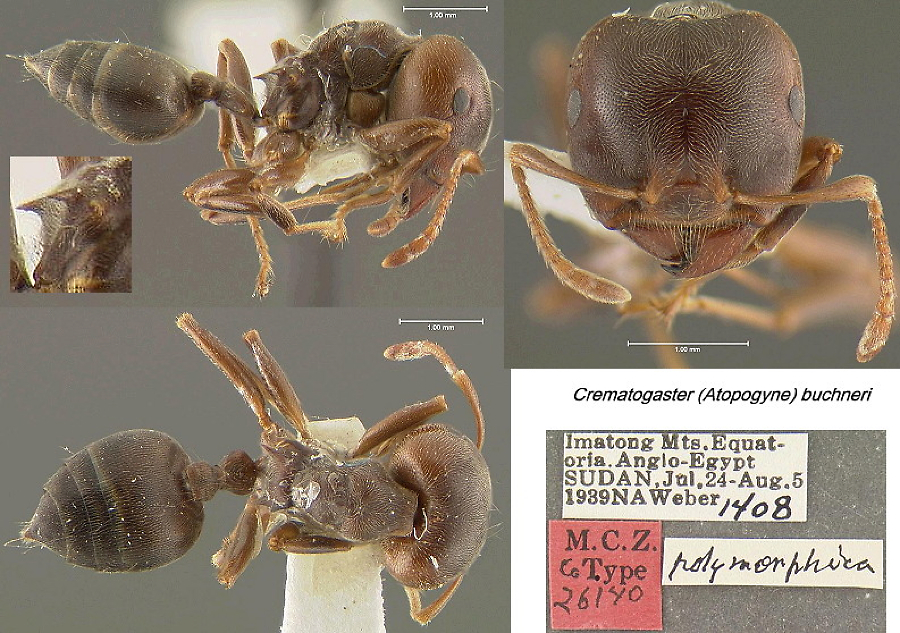 The
photomontage of polymorphica Weber (1943c) is
collated from http://mcz-28168.oeb.harvard.edu/mcz/FMPro?-DB=Image.fm&-Lay=web&-Format=images.htm&Species_ID=26140&-Find.
These show that it is a junior synonym of buchneri and not of africana. The
photomontage of polymorphica Weber (1943c) is
collated from http://mcz-28168.oeb.harvard.edu/mcz/FMPro?-DB=Image.fm&-Lay=web&-Format=images.htm&Species_ID=26140&-Find.
These show that it is a junior synonym of buchneri and not of africana.
|
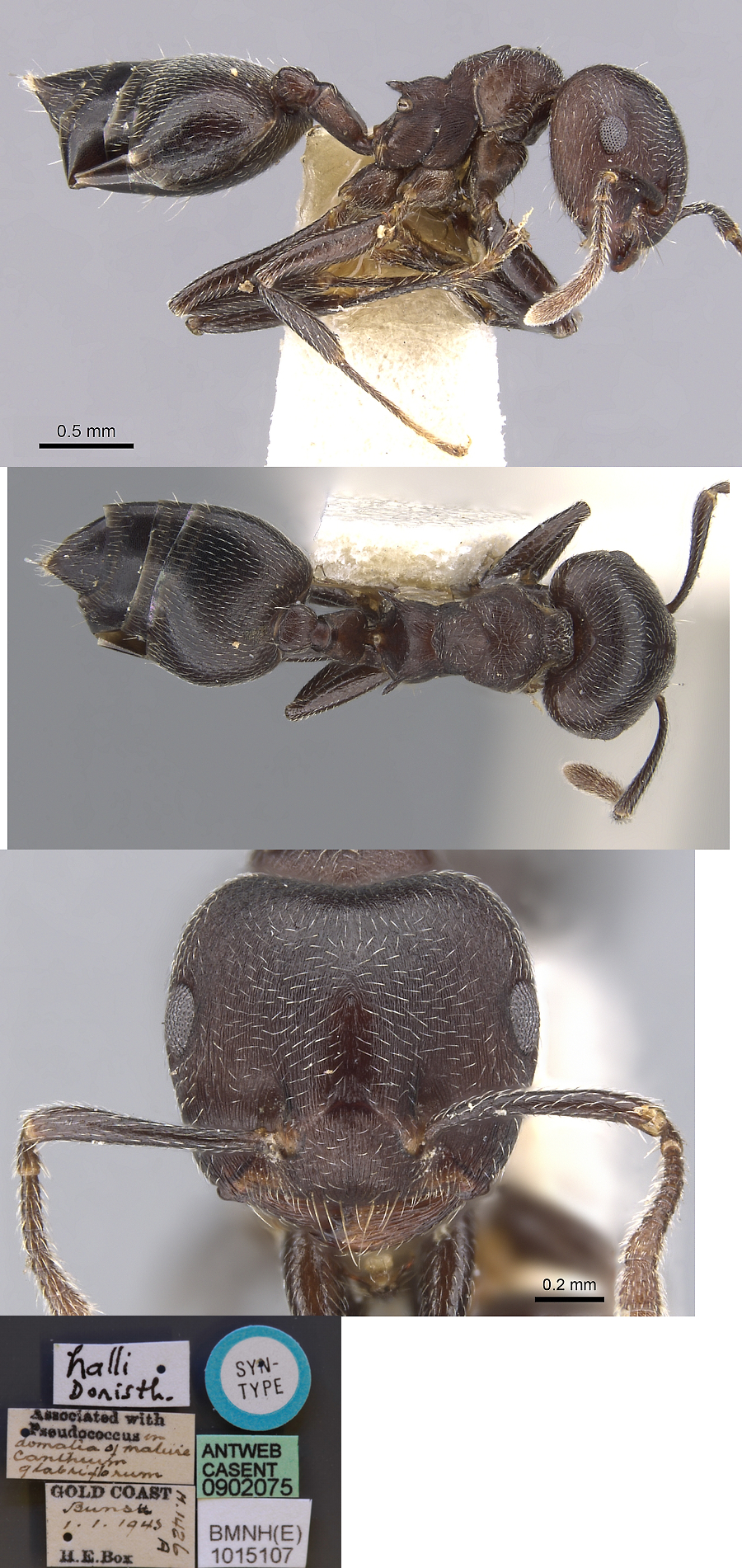 The
photomontage of a syntype worker of halli is
collated from http://www.antweb.org/specimen.do?name=casent0902075 The
photomontage of a syntype worker of halli is
collated from http://www.antweb.org/specimen.do?name=casent0902075
|
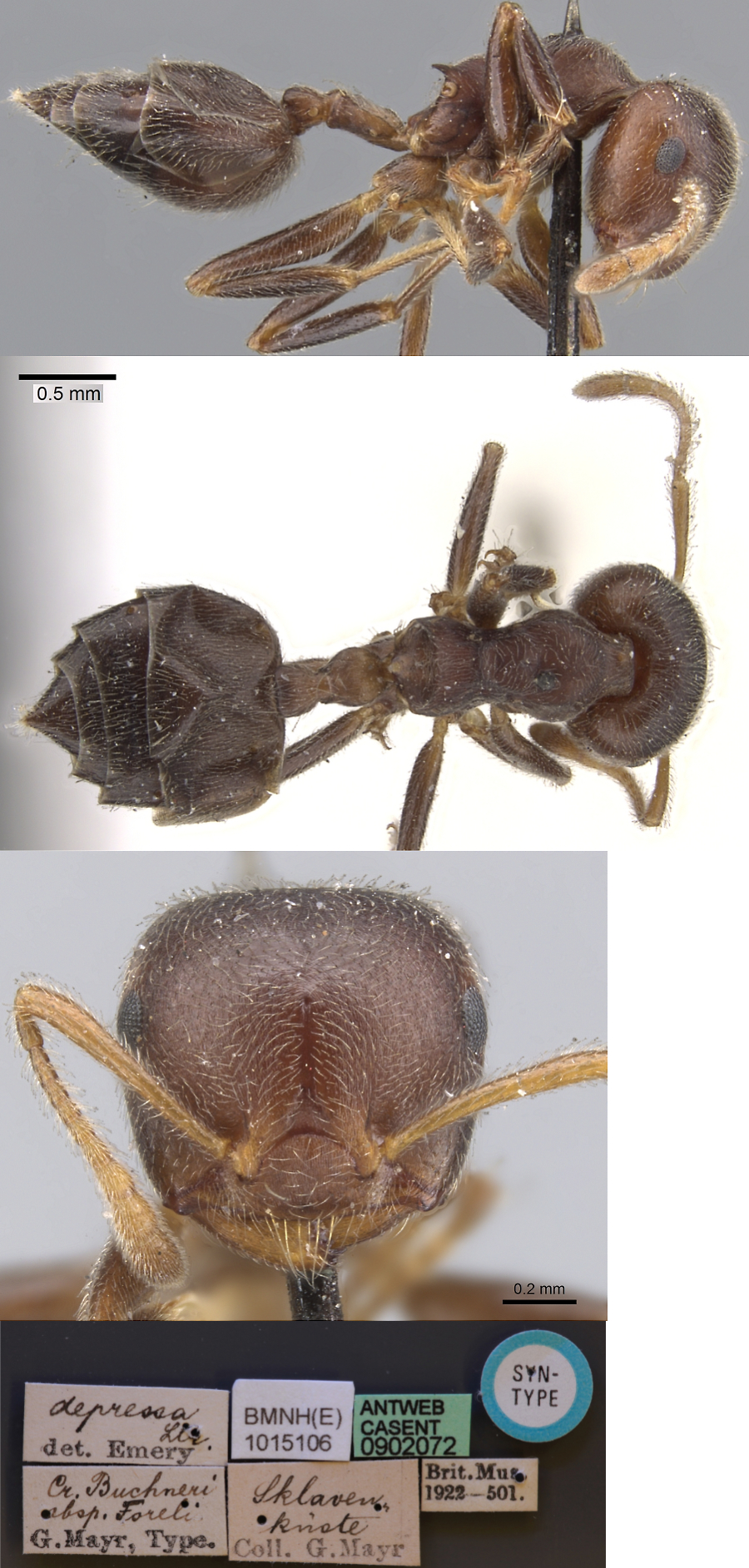 The
photomontage of a syntype worker of foreli is
collated from http://www.antweb.org/specimen.do?name=casent0902072 The
photomontage of a syntype worker of foreli is
collated from http://www.antweb.org/specimen.do?name=casent0902072
|
|